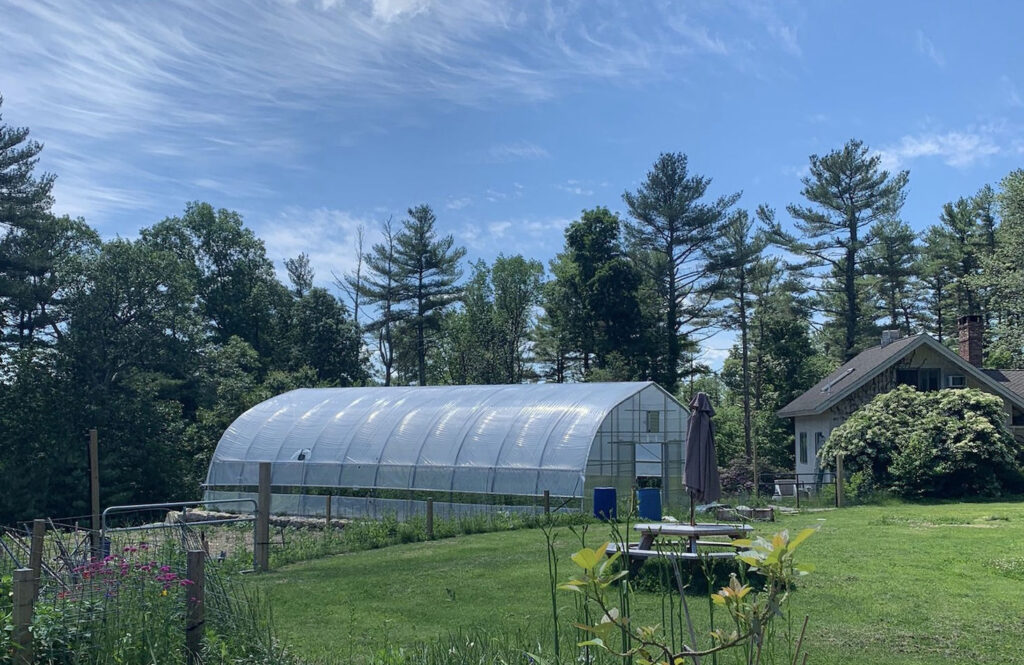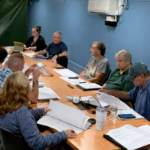
The nearly self-sustaining Honey Nut Farm sits on 6 acres off Pond Street. PHOTO/HONEY NUT FARM
People responded to the pandemic in different ways. Some rode it out as best they could, while others saw an opportunity for change.
For David Kraus and his family, it was a chance to take the next step in the transformation of their property on Pond Street and become more self-sufficient. They already had constructed a carbon-negative home in 2018 — no utilities other than what their solar panels produce — and they went to work on their land.
“As soon as COVID looked like an issue coming down the pike, we started transforming our land into a farm,” Kraus said. “Our goal is to grow all of our food — and I mean everything, except salt, which you can’t get outside of the ocean. Our goal is, a couple of years from now, to go a whole year eating only what we grow, and milk from our goats and harvest from our chickens. Our goal is to be a showcase of how people, if they’ve got 5 or 6 acres, can feed a small community on their land and have the nutritional benefit of not having their food imported from Southern California, Mexico or China.”
Part of Kraus’ inspiration was not wanting to be in a difficult position due to a lack of consumer goods. Another was his family history.
“I’m the first generation that hasn’t been a farmer since the 1200s,” he said. “The pandemic hit, and the grocery stores had lines and were running out of toilet paper and all of this weird stuff. It just felt so wrong. My mother grew up on a subsistence farm; they grew everything. Her parents came from the Donbas region of the Ukraine and grew all of their own food. So it’s both been in my blood, and COVID just kind of flipped the switch to say, ‘We’ve got to do something.’ I had more time on my hands — I still had my job [as a psychologist], but it’s not like I could travel for work. So I started cutting down trees and growing food.”
The family had nothing more than a small vegetable garden to start, but after clearing the land — which is between Lake Whitehall and Upton State Forest — they have planted trees and seeds to grow a wide variety of foods, and they have goats, chickens and bees as well. They named it Honey Nut Farm.
“We had maybe a 10-by-20-foot little garden that grew tomatoes,” Kraus recalled. “We’ve turned it into almost every square inch is productive with something, even if it’s replacing our lawn with clover for the bees.
“If you go through the various food groups, our sugars all come from maple trees and honey from the bees, our fats come from goat milk and hazelnuts that we grind. Our starches come from chestnut trees that we’ve repopulated; we’ve got 50 chestnut trees. We get our proteins from goat milk and make yogurt and cheeses. Then we have a CSA [community supported agriculture] that produces produce that we try to make a tiny bit of money from. It doesn’t take from what we’re doing, but it helps to educate the public that maybe they can do something in their backyard — maybe not as crazy as we’re doing, but maybe they can plant a little-leaf linden tree instead of an oak tree because it’s edible. Linden leaves are one of the tastiest foods you can eat. It’s got a five-star rating.”
As part of a CSA, an individual commits to purchasing food from the farm (honeynutfarm.com) over an extended period of time.
“We grow the food, the community basically buys what’s in season, like 21 weeks worth of produce, and they come and pick it up,” Kraus explained. “If they want to participate on the farm and they can volunteer, they can get some extra benefits, but they don’t have to.”
A farm manager who lives in the family’s former home on the property does much of the work maintaining the farm, which Kraus hopes to share with the community and help those who might want to try something similar themselves.
“Our main goal is to be an educational farm and help other people think about what they can do to be more independent in terms of their food security and its nutritional value — and even taste,” Kraus said. “Everything at the grocery store is designed to look good and survive a trip from wherever it came from, not based on how good it tastes or how nutritional it is.”
Cleanups continue
Spring is cleanup season, and there have been multiple opportunities for people to help tidy the town. The Hop Yellow Bag Day was held April 2 (postponed one day due to rain). About 25 volunteers showed up to help pick up trash.
“The amount of liquor cans, bottles and nips on the roadsides was crazy,” co-organizer Jeff Barnes shared. “Volunteers also found the front of a home safe, literally the front end of a car, and a mattress among the typical trash. Lots of trash on our roads! … I did a drive through town [the] afternoon after the collection and it looks so much better.”
The Lake Maspenock Preservation Association held its annual cleanup earlier this month, and the Friends of Whitehall (friendsofwhitehall.org) will hold a spring lake and trail cleanup this Saturday from 9 a.m.-noon, coinciding with the Massachusetts Department of Conservation and Recreation’s Park Serve Day. Volunteers will gather at the boat landing parking lot at Whitehall State Park on Wood Street and be assigned areas of trails and shoreline around the lake.






















0 Comments